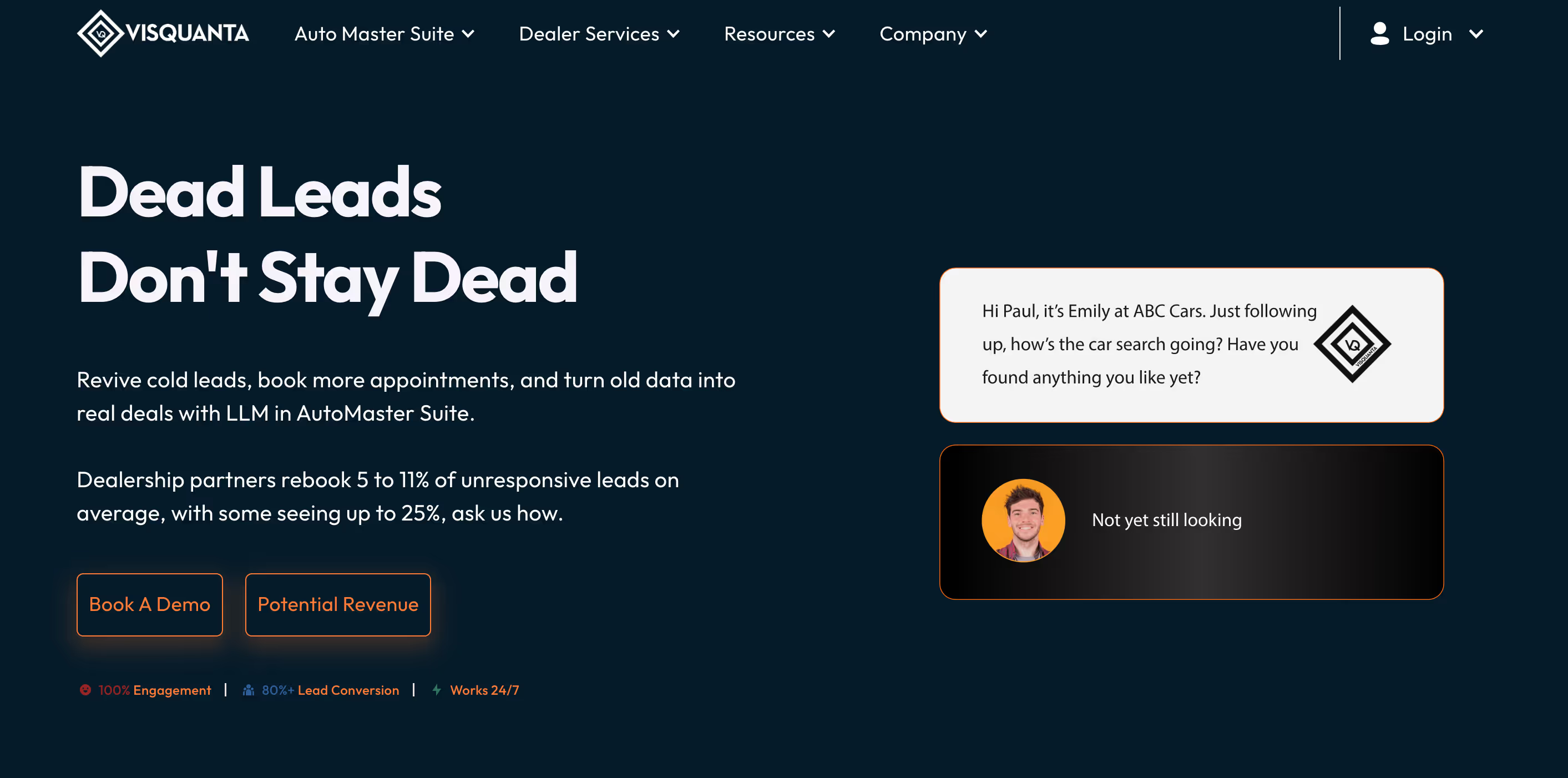AI is reshaping how car dealerships operate, making sales faster, smarter, and more tailored to customer needs. With 80% of dealerships planning to invest in AI by the end of 2025, those who act now will gain a competitive edge. Here's what AI is doing for dealerships:
- Boosting Sales: AI-powered chatbots increased sales by 67% on average, while predictive analytics cut inventory costs by up to 50%.
- Faster Lead Response: Reaching leads within 5 minutes can increase conversions by 20x, and AI ensures dealerships never miss an opportunity.
- Personalized Engagement: AI tools analyze customer behavior to recommend vehicles and send tailored follow-ups, improving lead-to-sale conversion rates by 32%.
- Inventory and Pricing Optimization: Predictive analytics help dealerships stock the right vehicles and adjust prices dynamically, reducing costs and increasing profits.
- Reputation Management: AI tracks customer sentiment and online reviews in real time, helping dealerships address issues early and build trust.
Dealerships using AI tools like CRM systems, chatbots, and predictive analytics are already seeing revenue grow by 10–30%. With the automotive AI market projected to grow from $4.7 billion in 2025 to $48.6 billion by 2034, now is the time to act.
How Dealers Are Using AI for Sales in 2025 | AI Sales Agents
AI-Powered CRM Systems for Better Lead Conversion
For many dealerships, traditional CRM systems often miss the mark. Consider this: 23.5% of potential buyers don’t receive follow-ups within 24 hours, and 13.3% are never even entered into the system - a gap that translates to millions in lost revenue [3]. AI-powered CRMs, on the other hand, tackle this issue head-on by analyzing customer behavior, predicting intent, and automating personalized outreach. The result? Dealerships using AI have reported a 32% boost in lead-to-sale conversion rates [4]. Let’s take a closer look at how these systems address key challenges in lead conversion.
Automated Lead Capture and Follow-Up
AI-powered CRMs excel at capturing leads from various sources - whether it’s web forms, social media, or in-person visits - and instantly engaging them through SMS, email, or phone. This is especially important as 57% of buyers now prefer online purchases [2].
Take the case of a Get My Auto dealer group. In March 2025, they implemented an AI-driven CRM and saw impressive results: a 40% jump in lead-to-appointment ratios, a 33% reduction in the time from first contact to sale, and a 30% cut in BDC staffing costs, all while maintaining performance [4].
The system’s AI assistant ensures every lead is routed efficiently, setting appointments and handling basic queries on the spot. This level of automation not only improves response times but also sets the stage for reactivating dormant leads and speeding up engagement.
Database Reactivation for Dormant Opportunities
Dealerships often sit on a goldmine of dormant leads - prospects that never converted but still hold potential. Traditional CRMs tend to let these leads fade away, but AI-powered systems bring them back to life. By analyzing past interactions, browsing habits, and even life events, these systems can re-engage prospects with tailored messages, exclusive offers, or specific vehicle recommendations. This approach can revive up to 25% more dormant leads compared to traditional methods [4].
What’s more, reactivating old leads is far more cost-effective than acquiring new ones. Re-engagement costs are just 5-25% of what it takes to generate new leads [6]. And since 50-60% of sales happen after the fifth follow-up attempt [5], this targeted outreach becomes an essential strategy for boosting sales without inflating budgets.
Faster Speed-to-Lead Response Times
In the world of automotive sales, speed is everything. Reaching out to a lead within the first five minutes can make you 20 times more likely to convert them into a sales opportunity [7]. Responding within just one minute? That can lead to a staggering 391% increase in conversions [7]. But after five minutes, the odds of qualifying a lead plummet by 80% [7]. Unfortunately, over 66% of dealership leads don’t receive a response within 24 hours, and 37% are mishandled or lost entirely [7].
AI-powered CRMs eliminate these delays by instantly engaging leads through chatbots or automated text messages. This near-instant response time is critical, as 78% of buyers go with the first company to reply [7], and 40% of customers are actively waiting for a response.
One example highlights the power of quick responses:
"If there are two identical businesses using a dealership crm, but one responds to all their messages in an hour and one responds to all their messages in five minutes or less, we would expect the second business to convert 25% more of its leads to paying customers."
In short, speed isn’t just a competitive advantage - it’s a necessity for maximizing lead conversions. AI-powered CRMs ensure dealerships stay ahead by responding faster, smarter, and more effectively.
Predictive Analytics for Inventory and Sales Planning
AI-powered tools aren't just about managing leads - they're reshaping how dealerships handle inventory and sales strategies. Predictive analytics, in particular, is a game-changer. By analyzing historical data, market trends, and customer behavior, dealerships can make smarter decisions about inventory and pricing. The results? Lower costs and better sales outcomes. For instance, predictive inventory analytics have been shown to cut holding costs by up to 50% and reduce stockouts by 35% [13]. This data-driven approach ensures that dealerships maintain the right inventory levels - avoiding both overstocking and empty shelves - while directly boosting profitability.
Demand Forecasting to Match Market Trends
Guesswork has no place in inventory planning when demand forecasting tools are in play. These tools analyze past sales, customer habits, and market trends to predict which vehicles will sell quickly and which might linger on the lot. Take ABC Motors, for example. By using predictive analytics to fine-tune their inventory, they increased sales by 15% in just six months [9]. Similarly, XYZ Dealership saw a 20% drop in holding costs after implementing an analytics-based inventory system [9].
The benefits extend beyond vehicles. In the automotive parts sector, one manufacturer reduced stockouts by 30% in half a year by integrating point-of-sale data with market trends [10]. Another distributor used predictive models to cut excess inventory by 25%, improving cash flow in the process [10]. These examples underline how data-driven forecasting helps dealerships align inventory with emerging trends, such as the growing demand for electric and hybrid vehicles [12], ensuring they stay ahead of the curve.
Real-Time Pricing Adjustments
Pricing strategies no longer need to be static. Predictive analytics enables dealerships to adjust prices in real time, taking into account factors like local demand, competitor pricing, inventory age, and seasonal trends. The result is dynamic pricing that adapts to the market. Businesses that integrate such analytics practices often see efficiency gains of up to 30% .
For example, dealerships can monitor metrics like days-in-inventory and use this data to tailor pricing strategies. During peak buying seasons, they might offer competitive rates, while slower-moving models could be discounted strategically to clear space. This flexibility ensures pricing remains competitive and inventory turnover stays healthy.
Sales Performance Insights
Predictive analytics doesn’t just stop at inventory and pricing - it also dives deep into sales performance. By analyzing key metrics like conversion rates, profit margins, and customer retention, dealerships can refine their sales processes and marketing strategies. This often leads to significant improvements, such as a 26% increase in lead-to-sale conversions [13].
Major players in the automotive world showcase the potential of these tools. General Motors, for instance, partners with Adobe to run real-time, personalized marketing campaigns tailored to customer preferences [11]. Tesla takes a different route, leveraging social media and customer feedback from its app and forums to guide data-driven enhancements [11]. These approaches allow dealerships to optimize advertising spend, customize marketing to local trends, and identify training opportunities for their sales teams.
Predictive analytics also extends its reach to operational efficiencies. For example, UPS uses advanced analytics to reduce left turns on delivery routes, saving an impressive 10 million gallons of fuel annually. For dealerships, the lesson is clear: regular data audits, precise customer segmentation, and diverse data sources ensure predictive models remain effective and relevant.
Automated Customer Engagement and Personalization
AI has reshaped how dealerships connect with customers, making engagement more intuitive and personalized across every step of the sales journey.
Gone are the days of generic follow-ups. With AI-driven automation, dealerships can now deliver tailored, around-the-clock interactions that anticipate customer needs and provide timely communication, guiding prospects seamlessly through the sales funnel. This shift is backed by data: 42% of retailers are already using generative AI for personalized marketing, leading to a 20% boost in customer satisfaction in retail settings [15]. For car dealerships, this translates to stronger relationships and improved conversion rates.
AI Chatbots for 24/7 Customer Support
Chatbots have become a cornerstone of modern customer service in the automotive world. Over 90% of U.S. car dealerships now offer some form of live chat or chatbot functionality [16]. These AI tools handle routine tasks like answering FAQs, scheduling service appointments, and qualifying leads with efficiency and precision.
For a chatbot to succeed, it needs clear objectives - whether that’s resolving queries, collecting customer information, or booking appointments. Training the chatbot with industry-specific knowledge ensures it can address concerns about vehicle features, services, or financing options. When integrated with tools like CRM systems, inventory management, and service scheduling platforms, the chatbot gains access to real-time data, allowing it to provide accurate, up-to-date responses. Adding a personalized touch by aligning the chatbot’s tone with the dealership’s brand helps build trust and fosters meaningful customer interactions.
Personalized Vehicle Recommendations
AI-powered recommendation engines are revolutionizing how dealerships pair customers with the right vehicles. These systems analyze a wealth of data, including browsing habits, stated preferences, budget constraints, and past interactions, to suggest vehicles tailored to individual needs. This approach mirrors the success of platforms like Netflix, where recommendation algorithms drive 80% of content views.
What sets these systems apart is their ability to go beyond simple filters like price or vehicle type. They factor in details such as family size, commuting habits, lifestyle choices, and even seasonal trends to deliver highly relevant suggestions. This level of personalization not only enhances customer engagement but also significantly increases the chances of a sale. Automated follow-ups further ensure that these tailored recommendations lead to actionable opportunities.
Automated Follow-Ups and Marketing Campaigns

Timing is everything in automotive sales, and AI automation ensures no lead slips through the cracks. Multi-channel reminders—via email, SMS, and social media—help reduce delays and boost appointment rates. For example, a dealership in Florida cut its lead response time by 70%, resulting in a 40% increase in appointments [17].
AI also excels in lead scoring, using behavioral data to identify which prospects are most likely to convert. This allows sales teams to focus their energy where it matters most, streamlining efforts and maximizing results.
Reputation Management and Customer Satisfaction Tracking
Converting inquiries into sales goes hand in hand with maintaining a strong reputation. With 97% of buyers relying on reviews and a solid online presence increasing sales by 30%, AI-driven reputation management has become a game-changer as we approach 2026 [19].
AI tools not only monitor review platforms and social media but also help safeguard your brand while uncovering opportunities to enhance customer satisfaction. Let’s break down how these systems track feedback and address potential concerns before they escalate.
Real-Time Feedback Monitoring
AI systems excel at monitoring customer sentiment across platforms like Google Reviews, Yelp, Facebook, Twitter, and specialized sites such as DealerRater. They analyze feedback in real time, categorizing it by tone and flagging urgent matters that require immediate action. This allows dealerships to respond within hours, showcasing their dedication to customer care.
Rick Beadles, General Manager at Huffines Auto Group, highlights the benefits of such systems:
"This system is immediate, user friendly, very concise, and that allows us to be proactive with any issues that may arise. Not to mention how easy it allows customer access on-line review sites for 5-star reviews." [18]
Additionally, AI can automate follow-ups with satisfied customers, encouraging them to leave positive reviews. By 2026, it’s expected that 80% of customer-focused organizations will adopt sentiment analysis tools [20].
Resolving Customer Issues Before They Escalate
While monitoring identifies concerns, swift resolution ensures they don’t spiral out of control. AI tools analyze customer interactions to detect dissatisfaction early. When negative sentiment is flagged, the system notifies management, a critical step given that 92% of unhappy customers share their experiences with others .
AI-powered solutions streamline resolutions by identifying the root of the problem and suggesting appropriate responses. Companies using AI-driven speech analytics have reported a 10% or higher boost in customer satisfaction scores while cutting operational costs by 20% to 30% [21]. These tools also have a direct financial impact: loyal customers spend 67% more than new ones [19], and increasing retention by just 5% can lead to a revenue jump of up to 95% [21].
Incorporating AI tools for reputation management not only prevents customer defection but also drives a 30% increase in customer spending.
Conclusion: Maximizing Sales Potential with AI
The automotive industry is entering a transformative phase as 2026 approaches. A staggering 95% of dealerships see AI as a critical factor for their success, with over 80% already deploying or planning to implement AI solutions by the end of 2025 [1]. The real question isn’t whether to adopt AI - it’s how to do it in a way that drives meaningful results.
The numbers speak for themselves. Every dealership that has integrated AI into their operations reported revenue growth in the past year [25]. More specifically, 55% of these dealerships achieved revenue increases ranging from 10% to 30% [27]. Additionally, McKinsey research highlights AI’s potential to cut operational costs by as much as 40% . These results underscore the tangible impact of AI when applied thoughtfully.
But success with AI isn’t just about plugging in new technology - it’s about strategy. Aaron Rowley, CTO of Visquanta, puts it plainly:
"You're not buying software. You're not buying features. You are buying a person, an AI employee that is gonna talk to your customers every day. And so you gotta ask questions like you're interviewing a new BDC rep."
This perspective emphasizes the importance of selecting the right AI partner and ensuring the tools align with your dealership’s goals. Beyond selection, proper training and compliance are critical. Teams trained to convert phone calls into appointments, for example, often see conversion rates soar to 60–80%, compared to just 28% for teams without adequate preparation. To maintain these results, dealerships need formal compliance plans, designated AI compliance officers, and ongoing staff training to stay ahead of regulatory requirements [26].
Long-term success hinges on more than just implementation - it requires continuous refinement. As Knowtrex advises:
"Continuous evaluation is key. Dealerships should routinely assess AI tools and best practices to ensure measurable impact and alignment with customer needs." [27]
The global automotive AI market is forecasted to grow from $4.7 billion in 2025 to nearly $48.6 billion by 2034 [27]. Dealerships that take a proactive, strategic approach to AI integration will be well-positioned to seize the largest share of this expanding market. By focusing on execution, training, and ongoing optimization, dealerships can lay a strong foundation for sustained success in the evolving automotive landscape.
FAQs
How can AI-powered CRM systems help car dealerships boost lead conversion rates?
AI-powered CRM systems are transforming how car dealerships handle leads, offering tools that can dramatically boost conversion rates. With AI-driven lead scoring, these platforms identify the most promising buyers, helping sales teams focus their efforts where it matters most. They also automate follow-ups, ensuring potential customers receive timely and consistent communication, keeping their interest alive.
What sets these systems apart is their ability to enable personalized interactions. By tailoring messages and offers to match individual preferences, dealerships can build trust and create a more engaging experience - making customers far more likely to close the deal.
By simplifying and optimizing these critical processes, dealerships not only improve efficiency but also achieve higher lead-to-sale conversions. It's a smart way to stay ahead in a market that’s constantly evolving.
How can predictive analytics improve inventory management and pricing strategies for car dealerships?
Predictive analytics gives car dealerships a powerful edge by helping them anticipate customer preferences for particular vehicle models, trims, and features. With these insights, dealerships can maintain an inventory that aligns with demand, avoiding both overstock and shortages.
It also plays a key role in shaping dynamic pricing strategies. By examining market trends, competitor pricing, and historical sales patterns, dealerships can adjust prices in real time. This approach not only keeps them competitive but also opens up opportunities to boost revenue effectively.
How can AI chatbots improve customer engagement and support for car dealerships, and what are their main advantages?
AI chatbots are reshaping how car dealerships interact with customers by offering round-the-clock support and tailored conversations. These virtual assistants can handle everything from answering questions and booking test drives to guiding buyers through the entire purchasing journey - all while ensuring a smooth and efficient process.
Here’s why they’re making such a big impact:
- Faster lead conversion: Chatbots respond instantly to potential buyers, cutting down wait times and increasing the chances of turning interest into sales.
- Better customer experience: With quick, accurate responses and personalized recommendations, chatbots help build trust and keep customers coming back.
- Cost savings: By automating repetitive tasks, dealerships can reduce staffing costs while maintaining high-quality service.
As dealerships adapt to a rapidly changing market, AI chatbots are proving to be a game-changer, helping businesses streamline operations and deliver standout customer experiences.
.avif)




.avif)






.svg)

